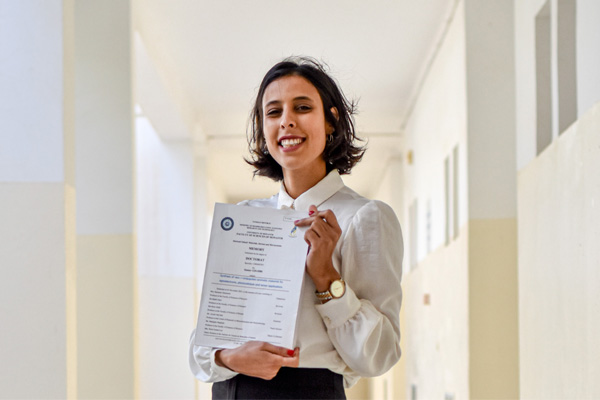Samar Gharbi, a new doctor from ICMM: "Scientific research can really make a difference in the world and improve our quality of life"
The young researcher defended her thesis last November at the Faculty of Sciences of Monastir (Tunisia). One of her co-supervisors was Berta Gomez-Lor, from ICMM.
 Samar Gharbi is a young researcher who just defended her Ph.D. thesis last November at the Faculty of Sciences of Monastir (Tunisia). During her years of study, she had some stais at the Institute of Materials Science of Madrid (ICMM), CSIC, where she worked along with Berta Gomez-Lor, who is also one of the co-supervisors of her thesis. Entitled “Synthesis of new π-conjugated aromatic materials for optoelectronic, photocatalysis and sensor applications”, she defends the results of her job with these words: "These encouraging results lead us to believe that these materials could have potential applications in the field of pollution control or water and environmental decontamination".
Samar Gharbi is a young researcher who just defended her Ph.D. thesis last November at the Faculty of Sciences of Monastir (Tunisia). During her years of study, she had some stais at the Institute of Materials Science of Madrid (ICMM), CSIC, where she worked along with Berta Gomez-Lor, who is also one of the co-supervisors of her thesis. Entitled “Synthesis of new π-conjugated aromatic materials for optoelectronic, photocatalysis and sensor applications”, she defends the results of her job with these words: "These encouraging results lead us to believe that these materials could have potential applications in the field of pollution control or water and environmental decontamination".
"I am working under the supervision of Dr. Berta Gomez-Lor at the ICMM as a co-supervisor and under the supervision of Dr. Khaled Hriz as a co-supervisor and Pr.Mustapha Majdoub as my thesis director at the Faculty of Sciences of Monastir", explains the researcher. She has been at our centre on three different stays because of the "excellent reputation of the ICMM and the quality of the scientific research carried out by its internationally recognized professors". In Madrid, Gharbi has been able to get solid experience in synthesizing organic molecules and developing functional organic materials.
Asked about explaining her work to a non-scientific audience, she is clear: "A good chemist is a good cook". "My thesis topic is, as a first step, the preparation of organic materials... for this, I will select my products, weigh them, purify them and assemble them to make these materials", she says. And she uses the example of a cake to visualize it: "The difference is that my cake contains chocolate and my materials contain functional groups".
She adds: "Let's go back to our kitchen, imagine that the pollution in our plates exceeds 50\\% because of the presence of harmful contaminants of a complex and non-degradable nature". Continuing in this scenario, the scientist explains that the contaminants cause problems to our health; therefore, the treatment of these problems becomes more than a choice but an obligation. "This is exactly the aim of my thesis, I will apply my strong materials, which I have prepared with these functional groups for the maintenance of our health, in two ways: the first is as a sensor, as a result of interactions between the contaminants and my material, which is an action, similar to that of an iron placed in front of a magnetic magnet, and that it attracts strongly! and remains very attached. And the second way is photocatalysis, which is the strongest way, where my material will show its sporting side as a boxer, by totally destroying the contaminants in an aqueous medium, using its exposure to ultraviolet light".
The researcher is so proud of the results she got: "these macromolecular materials have proven to be efficient and provide a new platform for the development of various environmental remediation applications, such as the detection of toxic organic pollutants, the detection of toxic metals, and the adsorption and photocatalytic degradation of certain organic pollutants," she says.
Now, as a new doctor, she has a bright future ahead: "I see myself doing very well in the research field and I would like to continue my career in scientific research, especially in the field of organic materials and their applications." And she concludes our interview by talking about science and her vision: "I became a scientist because scientific research can really make a difference in the world and improve our quality of life". Her work is, without a doubt, a great example of how science can make a better world.
-- Ángela R. Bonachera. ICMM Communication and Outreach Unit. Photo: CS Photographer --
Instituto de Ciencia de Materiales de Madrid (ICMM)
Sor Juana Ines de la Cruz, 3
Cantoblanco, 28049
Madrid, España
Telephone: (+34) 91 334 90 00
Email: @email
Communication Office: @email

Acknowledge the Severo Ochoa Centres of Excellence program through Grant CEX2024-001445-S/ financiado por MICIU/AEI / 10.13039/501100011033

Contacto | Accesibilidad | Aviso legal | Política de Cookies | Protección de datos
